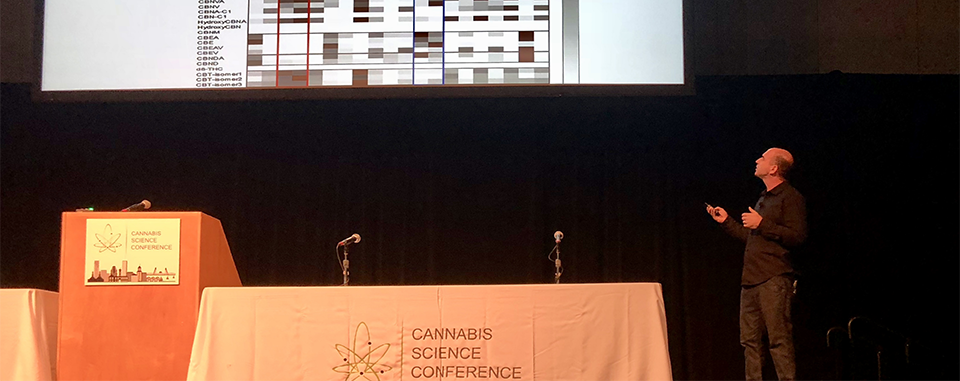Cannabis Science Conference 2018
Last week’s Cannabis Science Conference brought us amazing speakers, excellent presentations, and a whole lot of discussion about lab testing. This was the third year of the aptly-named conference, and the content has never been better. The two-day conference is Portland’s yearly homage to all things cannabis science. Unlike a traditional science conference, where scientists present to each other, CSC cultivates an atmosphere that is accessible to cannabis consumers and professionals alike. The Farma team spent both days reveling in the information on display.
The conference had three tracks: Analytic, Cultivation, and Medical. These tracks each had two full days of speakers presenting on a range of subtopics. Additionally, there were research posters displayed in the exhibition hall. Some of the most famous voices in cannabis research were on hand to share their vision and passion with us.
Analytic Track
Dr. Dedi Meiri kicked off the conference with a discussion of his work in Israel. His lab has a library of over 140 cannabinoids, used to conduct experiments on how cannabis affects different diseases. Currently his focus is on cancer, autism, and pain. As we are well-aware, there is a ton of promising research about cannabinoids. Meiri’s work is to discover what combination of cannabinoids are responsible for that promise. Cannabis’ chemical expression is phenomenally diverse. That diversity makes it difficult to determine what compounds are beneficial. What three, or seven, or twenty cannabinoids are responsible for killing pancreatic cancer cells? Can you replicate results from a petri dish in rodents? What is the likelihood that it will work in humans? Meiri’s work is literally curing cancer.*
Ethan Russo, featured in last week’s blog post, was also at the conference. He called for a new classification system in the Analytical Track’s second day; one based on chemistry and not breeding history. His newest paper, “Pharmacological Foundations of Cannabis Chemovars”, informed his keynote lecture. Russo’s proposed system would take into account the ratio of THC to CBD as well as the three most dominant terpenes. If you’ve ever heard us mention the Entourage Effect, you’re familiar Russo’s most well-known theory. The current discussion about terpenes and their potential impact is due, in large part, to him. Not to mention he’s a genuinely delightful human. We owe a great deal of gratitude to the work of this short-statured giant.
Cultivation Track
This was the Cultivation Track’s first year at the conference. Cultivation technology has proliferated as growing has moved indoors. This transition means more interest in tracking environmental growth factors. From CO2 level to temperature to lighting, everything impacts how cannabis grows. And now we can measure it.
Allison Justice spoke about the pros and cons of switching from standard grow lights to LED ones. Turns out switching to LED not only reduces energy costs, but can also increase yield. The more light the better in cannabis grows, and LEDs allow for a huge increase in light output. While startup cost can be prohibitive, in a short amount of time the increased output makes up for that cost. Using LEDs for grow lights is win-win.
Medical Track
The Medical Track was chock-full of anecdotal evidence. Doctors are seeing more patients reporting cannabis’ positive impact. This is especially poignant as many patients turn to cannabis as a last-ditch effort to manage symptoms. The positive results they experience are changing doctors’ minds. As minds begin to change, we can hope for an increased interest in clinical trials for cannabis. Clinical trials are the gold standard in Western medicine. They show how effective a particular medication is for a specific disease. Unfortunately, clinical trials run into all sorts of barriers in the US. We have a long way to go to catch up with the rest of the world.
Jan Roberts has seen impressive results in her patients who use cannabis. As a clinical social worker at NYU, most of the people she works with struggle with severe mental disorders. She began to notice a distinct lack of research into cannabis and mental health. Furthermore, there is significant bias in mental health workers against the use of cannabis. These factors have led many patients to seek medical advice from under-qualified budtenders. Seeing this, Roberts is laying the foundation for mental health research to occur. Research is the best way to move away from budtenders giving medical advice and towards medical professionals doing so.
More conference coverage to come
The Cannabis Science Conference gave us two days stuffed with information. Keep checking the blog to learn more. Talented geneticist Reggie Gauldino talked about the importance of cannabis genetics. Dr. Sue Sisley gave us an update on her work with veterans and athletes. One of the posters showed a chemical breakdown of a Jamaican landrace. Ya know, science stuff.
* ‘Cancer’ is a catch-all term used to describe hundreds of different diseases. These diseases each respond to different treatments. Cannabis might work well for some types of cancer, be neutral at others, and have a negative impact on yet others. Meiri’s work is to clarify cannabis’ effect for as many types of cancer as he can.

